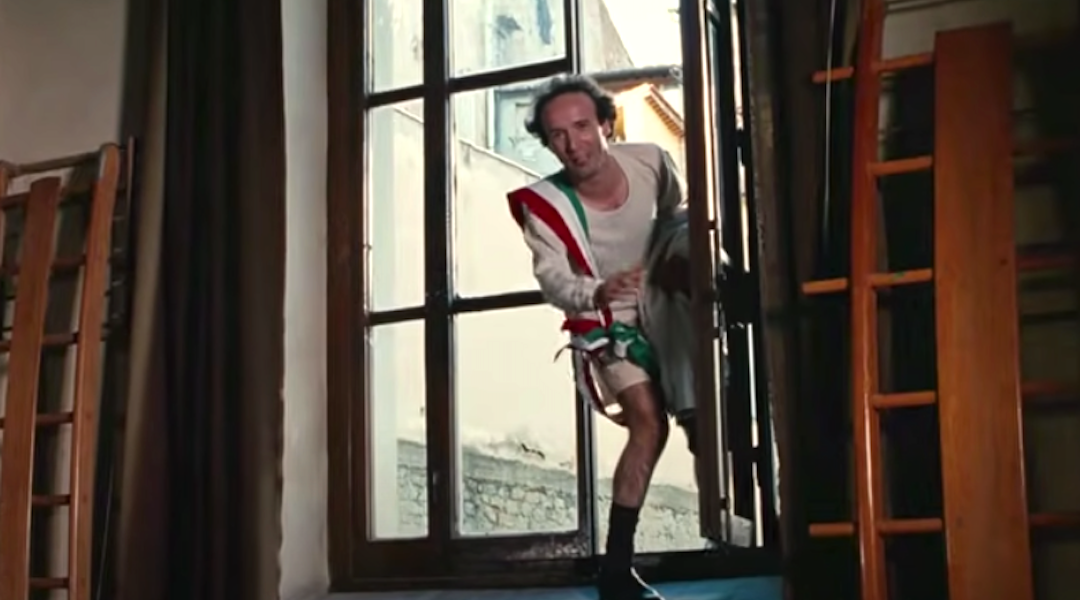The creation of the new Holocaust comedy “Life Is Beautiful” began with an impromptu monologue from its Italian star and director, Roberto Benigni.
Benigni was sitting with his co-writer in a Rome restaurant when he brainstormed a speech about a father convincing a son that their lives in a concentration camp are a game.
It was then that he realized, paradoxically, that a concentration camp was the best place to prove the beauty of life, Benigni explains.
If beauty, such as the love and protectiveness a father feels for a son, could be found in the worst of all places, then it could be found everywhere.
“This story is so simple,” Benigni said in a recent interview with JTA.
Well, actually, it’s not. “Life Is Beautiful,” which opens Oct. 23 in New York, Los Angeles and Israel, is complex.
The movie is divided into two sections: In its first, madcap part, Guido (Benigni) magically and manically woos a beautiful teacher Dora — played by Benigni’s real-life wife, Nicoletta Braschi — stealing her away from an Italian fascist official. The two marry and have a child, Giosue, played by Giorgio Cantarini.
In the second, serious half of the movie, the family is sent off to a death camp, and it is there that Guido constructs the ruse that life in the camp is a game that he and Giosue must win. Guido concocts the scheme to ensure that his son follow the camp’s rules in order to give him the best chance of staying alive.
The poetic and ambitious tragicomedy, as one might imagine, walks several tightropes. One is weaving together the narrative thread, making sure that the comedy of the first half blends with the film’s darker second half. But most of Benigni’s balancing act has to do with the delicate subject matter of the Holocaust.
Few movies have attempted to combine humor and Nazism. After learning about the horrors of the concentration camps, Charlie Chaplin, one of Benigni’s idols, wrote in his autobiography that he regretted his 1940 parody of Nazism, “The Great Dictator.” In Mel Brooks’ 1967 “The Producers,” Zero Mostel and Gene Wilder played two Jews who put on a Broadway musical called “Springtime for Hitler.”
But, as commentators have noted, only the Italian film “Seven Beauties” attempted, as Benigni does, to bring humor to the death camp itself.
Benigni, whose acting style is reminiscent of a slightly toned-down Robin Williams and is best known to American audiences for his roles in Jim Jarmusch’s “Down by Law” and “Night on Earth,” is well aware of his film’s possible pitfalls.
Wearing a brown suede coat and square black glasses in a recent interview, Benigni is quick to emphasize the uniqueness of the Holocaust, calling it the “platonic idea of evil in our minds.” A Catholic whose father spent time in a German labor camp during the war, Benigni also said that after he read a book by Italian Holocaust survivor Primo Levi, “I was not the same man I was the day before.”
Concerned about the Jewish aspects of the film, Benigni sent the script to Marcello Pezzetti of the Center for the Documentation of Contemporary Judaism in Milan. Pezzetti also served as a consultant on the film.
Some have objected, with some justification, to the film’s depiction of life in the camps. Parents and children did not live together in the camps, as Guido and Giosue do. And some of the stunts Guido pulls off at the camp would have been impossible in real life.
For his part, Benigni defends his film as a “fable,” not a documentary, and to his credit, “Life Is Beautiful” doesn’t shy away from the issue of gas chambers or other difficult and painful issues.
While “Life Is Beautiful” had already played to sellout audiences in Italy and won the grand jury prize at the Cannes Film Festival in May, Benigni admits that he was worried about the Israeli reaction to the film when it was shown at the Jerusalem Cinematheque’s annual film festival.
Benigni says he was “touched” by the audience’s response. During the first, humorous part of the film, the audience laughed twice as hard as European audiences had — laughing as if they were “naked, vulnerable,” he said. During the second half of the film, the audience was silent, a silence that continued for about 90 seconds after the film ended before most of the crowd broke into loud, rhythmic applause.
Of course, some attendees at the Jerusalem screening criticized Benigni for bringing laughter into a death camp and downplaying the Holocaust, according to press reports. But some survivors have defended the film, saying that humor existed even at Auschwitz.
Jewish groups have, on the whole, applauded “Life Is Beautiful.” Benigni’s co- star Braschi said that when the film was screened for Milan’s Jewish community, the crowd cried a “weep that made them feel better, not a weep that made them feel sorrow.”
It Italy, where the Holocaust has become a hot topic in recent years, children loved it, voting it their favorite film of the year and showering Benigni with letters about how they identified with both Guido and Giosue.
“Comedians are considered to be on a low level. I think the opposite,” said Benigni. “Sometimes only clowns can reach the summit of tragedy.”
The Archive of the Jewish Telegraphic Agency includes articles published from 1923 to 2008. Archive stories reflect the journalistic standards and practices of the time they were published.




